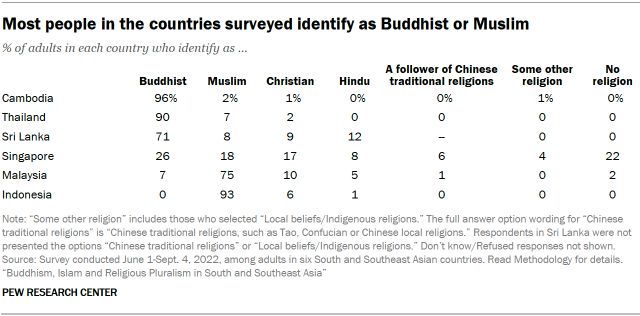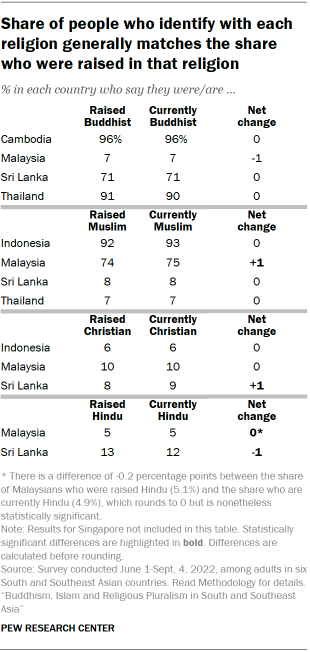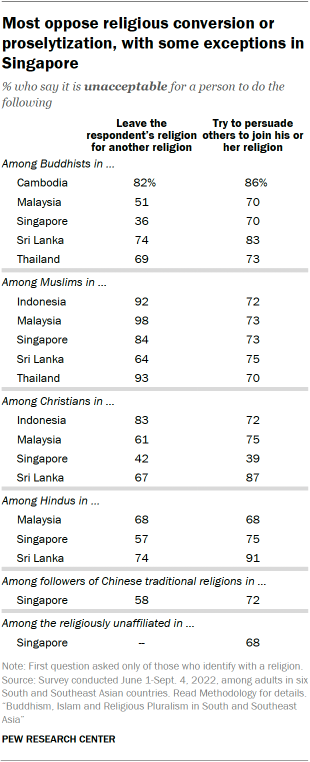Among the six countries surveyed, Buddhists make up a majority in three (Cambodia, Sri Lanka and Thailand) and Muslims in two (Indonesia and Malaysia). Singapore, which ranks among the most religiously diverse countries in the world, has no majority religion and is home to substantial communities of Buddhists, Muslims, Christians, Hindus, followers of Chinese traditional religions and religiously unaffiliated people.
Singapore also is the only country surveyed in which a considerable share of people have a religious identity that differs from the way they were raised. Around a third of Singaporean adults (35%) have changed their religion during their lifetime.
Similarly, with the exception of Singapore, nearly all respondents in the region say they are raising their children in the same religion as their own.
Not only is there little religious change in most of these countries, but large majorities across countries and religious groups generally think it is unacceptable to leave their religion, and most respondents also consider it unacceptable for someone to try to persuade others to join their religion. Again, Singaporeans stand out with differing opinions on these questions, with the growing Christian community particularly likely to see proselytization as acceptable.
Buddhists or Muslims make up majorities in most countries surveyed
The survey finds that most adults in Cambodia (96%), Thailand (90%) and Sri Lanka (71%) identity as Buddhists, while majorities in Indonesia (93%) and Malaysia (75%) identify as Muslim. By contrast, no religious group in Singapore forms a majority.13
Muslims make up 7% of adults in Thailand and 8% in Sri Lanka, which also has substantial shares of Hindus (12%) and Christians (9%).
In Muslim-majority Malaysia, 10% of the adult population identifies as Christian, 7% as Buddhist and 5% as Hindu, according to this survey. And in Indonesia, Christians make up the largest religious minority group, at 6% of the adult population.
Singapore stands out from other countries because of its population’s religious diversity. Around a quarter of adults in Singapore identity as Buddhists (26%), according to the survey, while 18% are Muslims and 17% are Christians. Smaller shares are Hindus (8%) or followers of Chinese traditional religions (6%). Notably, 22% of Singaporean adults say they have no religion, making Singapore the only country in the survey with a substantial share of religiously unaffiliated adults.

Across the region, few people have changed their religion

In five of the six countries surveyed, at least 95% of adults still identify with the religion in which they were raised. Consequently, the share of people raised in each religion roughly matches the share who identify with that religion today.
In Thailand, for instance, 98% of all respondents say their current religion is the same as their childhood religion. While 91% of Thai adults say they were raised Buddhist, 90% are Buddhists today. And identical shares of Thais say they were raised Muslim and are currently Muslim (7% each).
There is a similar pattern in Indonesia, where virtually all respondents identify with a religion that matches how they were raised as children.

In Singapore, respondents report a much higher degree of religious change. Overall, 64% of Singaporeans say their current religion is the same as their childhood religion, while 35% say their religion has changed.
These changes have resulted in a decline in the share of Singaporeans identifying as Buddhists or as followers of Chinese traditional religions. For instance, while 32% of Singaporean respondents report being raised as Buddhists, 26% currently identify as Buddhists. And 15% of adults in Singapore say they were raised to follow Chinese traditional religions, compared with 6% who claim such an identity today.
Contrastingly, a higher share of Singaporeans currently identify as Christian than the share who were raised Christian (17% vs. 11%). And the religiously unaffiliated population also has risen: 22% of Singaporeans now say they have no religion, up from 13% who say they were raised unaffiliated.
(For a more detailed discussion of religious conversion in Singapore, read “Share of Singaporeans identifying as Christian or unaffiliated is increasing.”)
Most parents surveyed are raising their children with the same religious identity as their own

The survey asked parents of children under 18 what religion they are raising their children in, if any. Across most countries in the survey, virtually all parents report that they are raising their children with a religious identity that matches their own.
This includes 100% of Thai Buddhist parents who are raising their children as Buddhists, as well as 100% of Malaysian Muslims who are raising their children as Muslims.
Parents in Singapore are an exception. Only 67% of Singaporean Buddhists say they are raising their children as Buddhists, while 85% of religiously unaffiliated Singaporean parents are raising their children without a religious affiliation. Even in Singapore, however, 99% of Muslim parents are raising their children as Muslims.
Is it acceptable to leave your religion or to persuade others to join?

The stability in the religious identity of people across the region may be linked to largely restrictive attitudes on whether it is acceptable for someone to leave their religion for another religion.
Most adults across religious groups say it is unacceptable to leave one’s own religion. This view is especially common among Muslims in Malaysia (98%), Thailand (93%) and Indonesia (92%).
But large majorities of Buddhists in Cambodia (82%), Sri Lanka (74%) and Thailand (69%) also say it is unacceptable for someone to leave Buddhism for another religion. Buddhists in Malaysia and Singapore – where Buddhism is not the majority religion – are significantly less likely to take this position.
The Singaporean public is divided on this issue: While most Muslims (84%) and followers of Chinese traditional religions (58%) in the country say it is unacceptable to leave their religion, fewer Buddhists (36%) and Christians (42%) take this position.
The survey also asked whether it is acceptable or unacceptable for someone to try to persuade others to join his or her religion (i.e., to proselytize). Across the surveyed countries, most respondents from all religious groups say it is unacceptable, with one exception. Fewer than half of Christians in Singapore – where Christianity has been growing – say that proselytizing is unacceptable (39%), while 59% say it is acceptable.


